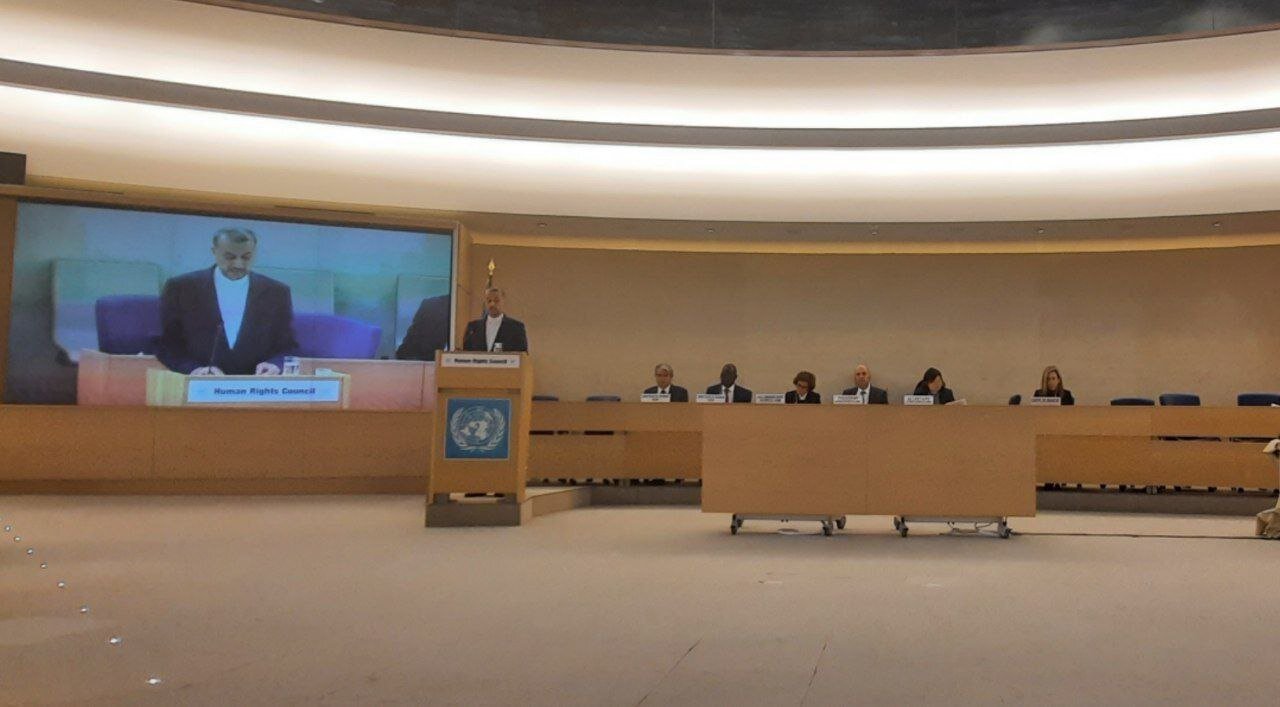TEHRAN – During his speech at the 55th session of the United Nations Human Rights Council at Geneva, the Iranian foreign minister voiced concern over the deterioration of the humanitarian situation in the Gaza Strip amid Israel’s onslaught.
Hossein Amir Abdollahian lamented the dire situation in Gaza and reiterated Iran’s diplomatic and international efforts to address the ongoing humanitarian crisis and proposed an extraordinary meeting of foreign ministers from Islamic countries.
He proposed the systematic and widespread ‘human slaughtering’ of the occupying war-mongering regime of Israel as the most important challenge in the path to the realization of the lofty goals of human rights. The top Iranian diplomat stated, “Indeed, one must admit that the world is facing the most reprehensible moral and humanitarian crisis, which is the result of 80 years of unconditional support for, and condoning, the colonial occupation and the continuous violation of the Palestinian people’s right to self-determination. During the past 142 days alone, more than one hundred thousand ‘human beings’ have been slaughtered or injured or buried under rubble in Gaza, and those who happen to be alive there, are facing an imminent death from starvation and infectious diseases.”
Amir Abdollahian also condemned the policies of the United States and the United Kingdom in the Red Sea and their attacks on Yemen, which he said have exacerbated the regional crisis.
He noted that Iran remains steadfast in adhering to and respecting human rights and dignity based on its national, cultural values and the Islamic teaching.
“US shows lack of commitment in ending Gaza war”
Engaging in crucial discussions at the sidelines of the UN session, Amir Abdollahian met with Mirjana Spoljaric Egger, the president of the International Committee of the Red Cross (ICRC).
Expressing gratitude for the committee's dedicated efforts in Palestine, particularly Gaza, the top Iranian diplomat painted a stark picture of the complex and deeply troubling humanitarian conditions in Palestine. He extended thanks for the committee's responsible initiatives and lamented how misguided political strategies have impeded the resolution of the Gaza crisis.
Amir Abdollahian, drawing from recent meetings with Palestinian Resistance leaders in Beirut and Doha, portrayed the dire situation in northern Gaza, where over 600,000 residents are grappling with food scarcity and hunger. He critiqued the U.S. stance, emphasizing a lack of commitment from them to ending the conflict, and underscored the imperative for democratic methods and political agreements among all Palestinian groups for effective post-conflict Gaza management.
The Iranian minister also expressed concerns over the impending threat of an Israeli attack on Rafah, with the potential to displace 1.4 million Palestinians, underscoring the magnitude of the human tragedy. While acknowledging the strength of military resistance, Amir Abdollahian stressed the urgent need for swift humanitarian aid.
Amir Abdollahian underscored Iran's persistent political efforts to bring about a resolution to the Gaza conflict.
The president of the International Committee of the Red Cross, in turn, conveyed deep concern about the severe humanitarian situation in Gaza, commending Iran's political endeavors to end the conflict. She outlined the committee's proactive initiatives to send aid and alleviate the consequences of war, highlighting the global community's shortcomings in addressing the crisis. Urging immediate action to tackle dire conditions and the lack of access to necessities in Gaza, she emphasized the pressing need for urgent efforts and immediate aid distribution. Additionally, she drew attention to alarming humanitarian conditions in other regional countries, underlining the committee's commitment to engaging with all relevant parties capable of managing such critical situations.
Amir Abdollahian also had meetings with his counterparts from Vietnam, Jordan, Kuwait, and Indonesia. Their discussions covered various bilateral and international issues, including the situation in Palestine, particularly the crisis in Gaza. Expressing contentment with the collaborative atmosphere in international forums, he underscored Iran’s commitment to nurturing these successful partnerships.
“Immediate ceasefire is necessary as situation in northern Gaza exacerbates”
Furthermore, the top Iranian diplomat engaged in discussions with António Guterres, Secretary-General of the United Nations.
Acknowledging Guterres's contributions to critical global issues, including the situation in Palestine, Amir Abdollahian drew attention to recent meetings with Palestinian Resistance leaders in Beirut and Doha. Commending the Resistance's military capabilities against the Zionist regime's aggression, he underscored the severe humanitarian situation resulting from the Israeli regime's occupation of the Palestinian territories and the ongoing crimes that this illegal entity keeps committing, notably in northern Gaza.
Expressing regret over Israel's ongoing siege of Gaza, supported by the U.S., to prolong the conflict despite Palestinian groups advocating a sustainable ceasefire, Amir Abdollahian highlighted the deep concern for the humanitarian crisis in northern Gaza. While acknowledging the UN's aid efforts, he emphasized their insufficient scale and noted the U.S.'s lack of commitment has exacerbated the crisis in the Red Sea and Yemen.
Raising concerns about U.S. military actions jeopardizing joint efforts between Iran and the UN to resolve the Yemeni crisis, Amir Abdollahian stressed Iran's support for the UN resolution for the Gaza conflict and to halt the genocide of Palestinians. He affirmed Iran's reliability for regional security contributions.
Guterres, expressing satisfaction with the meeting, voiced concern about the humanitarian crisis in Gaza, strongly opposing the collective punishment of Palestinians. Deeming the situation complex and worrisome, he emphasized the urgent need to end these conditions detrimental to the region. Despite the challenges, he appreciated Iran's diplomatic efforts to find political solutions for the Palestinian crisis and reduce regional crises.
Heading a diplomatic delegation, Amir Abdollahian arrived in Geneva early on Monday to attend the 55th regular session of the United Nations Human Rights Council (HRC) and the high-level segment of the Conference on Disarmament.


No comments:
Post a Comment